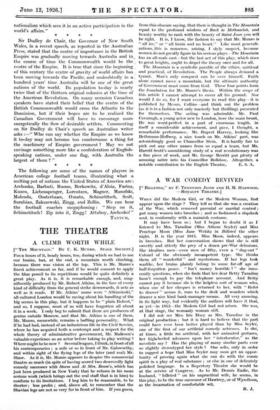THE THEATRE
A CLIMB WORTH WHILE ["Thu MOUNTAIN." BY C. K. MUNRO. STAGE SOCIETY.] FOUR hours of it, heady hours, too, during which we had to use our brains, but, at the end, a mountain worth climbing, ,because there was vision at the top. This is Mr. Munro's finest achievement so far, and if he would consent to apply the blue pencil to its repetitions would be quite definitely a great play. As it is, it is remarkable enough, and, mag- nificently produced by Mr. Robert Atkins, in the face of every kind of difficulty from the general strike downwards, it acts as well as it reads. If Mr. Atkins' name were " Atkinsinski," all cultured London would be raving about his handling of the big scenes in this play, but it happens to be "plain Robert," and so, I suppose, most of us will have forgotten all about it in a week. I only beg to submit that there are producers of genius outside Moscow, and that Mr. Atkins is one of them. Mr. Munro, meanwhile, remains a baffling personality. MO if he had had, instead of an industrious life in the Civil Service, where he has acquired both a contempt and a respect for the whole theory of administrative government, Mr. Malleson's valuable experience as an actor before taking to play writing ? Where might he be now ? Several leagues, I think, in front °fall his contemporaries ; a mile or so in front of Mr. Galsworthy, and within sight of the flying legs of the later (and real) Mr. Shaw. As it is, Mr. Munro appears to despise the commercial theatre so much (in spite of having scored two deservedly light comedy successes with Storm and At Mrs. Beam's, which has just been produced in New York) that he refuses in his more serious work (which brings out the real stuff that is in him) to conform to its limitations. I beg him to be reasonable, to be shorter ; less prolix ; and, above all, to remember that the Shavian legs are not so very far in front of him. If you guess, from this obscure saying, that there is thought in The Mountain equal to the profound wisdom of Back to Methuselah, and beauty worthy to rank with the beauty of Saint Joan you will be right. It is, I know, the fashion to say that Mr. Munro is "all ice," or "all brain and no heart." Like most generali- zations, this is nonsense, arising, I slyly suspect, because women do not greatly figure in his serious plays—The Mountain has an all-male cast—but the last act of this play, which rises to great heights, ought to dispel the theory once and for all.
The Mountain is a symbolic parable of the ethics, spiritual and practical, of Revolution. The People always demand a tyrant.. Man's only conquest can be over himself. Faith alone cannot move. a mountain, but the ultimate authority of Government must come from God. These four points form the foundation for Mr. Munro's thesis. Within the scope of this article I cannot attempt to cover all his ground. Nor would I do so, for I want everyone to read this play—it is published by Messrs. Collins—and think out the problem (as it is in a fashion not only masterly but thrilling) presented for themselves. The acting was admirable. Mr. Paul Cavanagh, a young actor new to London„ pore the main brunt. He was word-perfect_ in a part of enormous length, in itself a considerable achievement, and gave, I thought, a remarkable performance. Mr. Rupert Harvey, looking like Bethmann-Hollweg, a nice touch on Mr. Atkins' part, was astonishingly good as Chancellor Stein. It is hardly fair to pick out any other names from so equal a team, but Mr. Harold Scott's smouldering study of a real revolutionary was a fine piece of work, and Mr. George Merritt put plenty of amusing satire into his Councillor Bolkhov. Altogether, a
notable contribution to the English Theatre. E. S. A.






















































 Previous page
Previous page